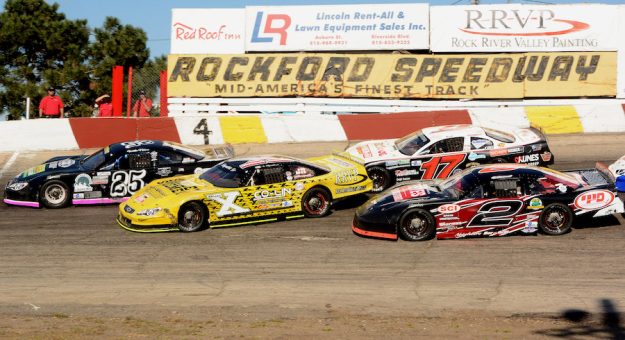INDIANAPOLIS — Sometimes, these things merely sting. Sometimes, they make you feel like you’ve been hit in the head with a hammer.
But when the phone, the text-message chime and social media all announced Rockford Speedway was closing for good at the end of this season, the hammer strike was followed by a jack-handle blow to the midsection. News like that can knock the wind out of you, even when it was as inevitable as sundown.
For years, there have been whispers that Rockford — a slice of bullring heaven in northern Illinois, 10 miles from the Wisconsin line — was drawing its last breaths. Now, sadly, it’s happening. Its heart will beat every weekend from late April through late October, and then no more.
Immediate cause of death: progress.
Underlying cause: suburban sprawl.
Rockford Speedway is not in the city of Rockford at all, but in smaller Loves Park. The area was rural when the track opened in 1948, but now the property is hemmed in on all four sides. Along busy State Route 173, which passes by the track’s main entrance, there are department stores, grocery stores, cellphone stores, medical facilities, pizza places and burger joints.
A satellite view shows houses and neighborhoods creeping in.
There’s not a lot of room left for development. Real estate people call that a seller’s market.
So the Deery family, which has controlled the track since 1967, has decided it’s time to let go. Next spring, the only engines roaring will be in the heavy equipment turning the 50-acre plot into a mix of mostly commercial properties.
I don’t like it, but I understand it. It’s a wonder, really, that the track survived this long, given land values and other factors. Such as? Well, flash back to 2020, when the COVID-19 scare led to shortened or canceled seasons at tracks across America, and limited attendance at whatever events did run. Rockford lost more than two months of its 2020 season, and then for a time its attendance was limited to 20 percent of capacity.
Assuming a track runs one night a week, a two-month closure is the equivalent of eight complete rainouts. Now factor in those limited-attendance events, and add those nights that are scrubbed by real rain, and you begin to see the downside of owning a track that sits on valuable land.
The Rock River Current, a local news website, reported that Rockford Speedway’s property taxes were “more than $65,000” in 2021. In a bright, dry season, that number is doable. But $65K is a tough check to write in times of dramatically slashed income. If you think that 2020 — and the fear of future 2020s —– hasn’t made lots of track owners ponder a sale, I’ve got my own piece of real estate you can have for the right price; it’s 15 miles east of Daytona Beach.
Hugh Deery — “probably the greatest short-track promoter in the world” in the eyes of Dick Trickle — died in 1984, and his wife Jody passed in 2022. All eight of their children have worked at the track, although that’s a funny way to put it, because none of them are kids anymore; they’re at what normal folks would call retirement age, yet still young enough to enjoy life.
Weighing an uncertain future against what will surely become a huge pile of money as the property is developed, sold or leased, who among us would have made a different decision than the Deerys did?
For a million reasons, I loved Rockford Speedway long before I set foot in Illinois. I’m a self-confessed nerd when it comes to racing history. In the early ’70s, before Smokey Yunick invented the internet, trade-paper stories screamed that Rockford was a place I ought to know about.
I learned that when Rockford opened in the postwar midget boom, Tony Bettenhausen was its first champion. I learned, too, that when high costs led to a midget slump, Andy Granatelli’s Chicago-based Hurricane Racing Ass’n stormed Rockford, its track-roadster fields boasting throttle-stompers such as Pat Flaherty and Jim Rathmann, both of whom would win the Indy 500.
In time, late models proved to be Rockford’s bread and butter, particularly as the cars got prettier and the drivers more polished. Between 1967 and ’72, Joe Shear brought six straight Rockford titles home to Beloit, Wis. In the same period, the immodestly named National Short Track Championships — conceived in 1966 by incoming speedway owner Hugh Deery — became one of America’s top weekend-warrior races.
Trickle declared that winning the inaugural NSTC was “the first big thing that ever happened to me. It paid $1,755, all in five-dollar bills. You could push down that stack of bills as hard as you could, and it was still a foot high.”
That day made Trickle the first in a long line of legends who won the National Short Track Championships: Mike Miller, Dave Watson, Mark Martin, Jim Sauter, Junior Hanley, Al Schill, Mike Alexander, Rich Bickle, Butch Miller, Scott Hansen and more. But two men on the list, Joe Shear and Steve Carlson, deserve special nods; each won the big race eight times.
I was there for Carlson’s last win in 2011. I’d studied the place for decades, but it was only that year that I saw Rockford for the first time. It looked just like all the photos I’d seen promised it would: old, worn, beat-up and downright beautiful. Its corners were tight, but the banking made possible outside passes and top-to-bottom crossovers.
“This place,” Bickle told me that day, “is the most technical track, the biggest driver’s track, in maybe the whole country.”
Now it’s going away. A crying shame? Absolutely. But the heartache is not exclusive to you and me. The Deerys, they loved Rockford Speedway, too. It’s going to be an emotional 2023.
This story appeared in the March 1, 2023, edition of the SPEED SPORT Insider.

